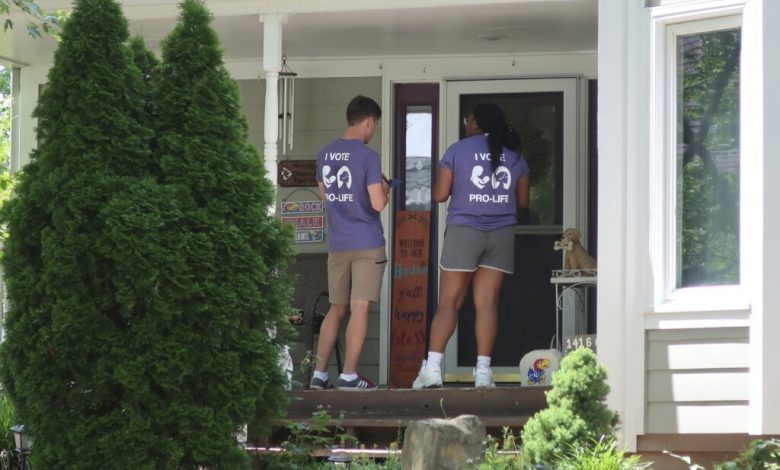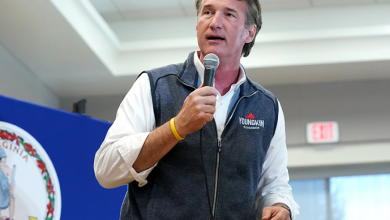Vulnerable House Dems see abortion as winning campaign theme

OLATHE, Kan. — A rare Democrat in a deeply Republican state, U.S. Rep. Sharice Davids of Kansas is one of the most vulnerable incumbents seeking reelection this year. In the final months of her congressional campaign, she is focusing on Republicans’ strict opposition to abortion rights.
An online ad she released last week highlights how Amanda Adkins, the Republican favored to emerge from Tuesday’s primary for a rematch with David in November, opposed abortion without exceptions. The ad points to Adkins’ support of an amendment to the Kansas Constitution on the ballot Tuesday that would make clear there is no right to abortion in the states.
“There were a lot of people who would not have known that I have an opponent who is extreme on this issue,” Davids, who beat Adkins in 2020, said in an interview. “It’s not hypothetical anymore.”
That’s a sign of how the Supreme Court’s decision in June to repeal a woman’s federal constitutional right to abortion has scrambled the political dynamics heading into the fall elections, when control of Congress is at stake. A half-dozen of the most vulnerable House members — all of them women, all representing swaths of suburban voters — see the issue as one that could help them win in an otherwise difficult political climate.
In addition to Davids, these incumbents include Reps. Angie Craig of Minnesota, Cindy Axne of Iowa, Elissa Slotkin of Michigan, Abigail Spanberger and Elaine Luria of Virginia, and Susan Wilds of Pennsylvania. They all face Republican opponents who support the high court’s abortion ruling. Some are contending with rivals who back efforts to ban abortion in all circumstances, including when the mother’s life is at risk.
It’s unclear whether the focus on abortion alone may be enough to mean reelection for many of these Democrats, who are running at a time of high inflation and frustration with President Joe Biden’s performance.
“In a close, toss-up election, which I think all of these are, it can make a difference,” said national pollster Christine Matthews, a self-described moderate who has worked for Republicans. “It’s not going to be what drives everyone to make a vote choice, but it will drive some people to make a vote choice.”
Twenty-two percent of U.S. adults named abortion or women’s rights in an open-ended question as one of up to five problems they want the government to address in the next year, according to an Associated Press-NORC Center for Public Affairs Research poll conducted in June. That has more than doubled since December.
Since the Supreme Court decision, as state governments have moved to act on abortion rights, AP-NORC polling has found a majority of people in the United States saying they want Congress to pass legislation guaranteeing access to legal abortion nationwide.
Overwhelming majorities also think states should allow abortion in specific cases, including if the health of the pregnant woman is endangered or if the pregnancy is the result of rape or incest.
Like those questioned overall, a majority of suburbanites think abortion should be legal in most or all cases, according to AP-NORC polling. Suburbanites also were slightly more likely than city residents and significantly more likely than people living in rural areas to say abortion or women’s rights are among the top issues for the government to address, according to the AP-NORC poll from June.
That’s particularly important in districts such as Axne’s in Iowa, which includes Des Moines’ teeming suburbs. Dallas County, west of Des Moines, has been one of the country’s fastest-growing counties since 2000, with the cornfields from decades ago now covered in new homes, schools and commercial developments.
In an interview, Axne was adamant that she would make abortion a central theme of her campaign. Axne’s GOP opponent is state Rep. Zach Nunn, who indicated in a primary debate that he opposes abortion without exceptions.
“I can’t even believe I have to say this. I have an opponent who would let a woman die to bear a child,” Axne said. “This is crap we don’t see in this country. This is the stuff we talk about in other countries and women not having rights.”
In Michigan, Rep. Elissa Slotkin faces state Sen. Tom Barrett, who supports only an exception to save a woman’s life.
“That’s more extreme than the 1931 law that’s on our books,” Slotkin said in an interview. “So I think that that’s an important contrast to make.”
The Adkins, Barrett and Nunn campaigns did not reply to telephone, email and text messages seeking comment for this story.
In Virginia, Yesli Vega, the Republican challenging Spanberger in a district that spans the suburbs of Washington, D.C., and Richmond, has not dismissed the debunked theory that pregnancy is unlikely in cases of rape. In audio published by Axios late last month, Vega was asked during a campaign event in May whether “it’s harder for a woman to get pregnant if she’s been raped.”
Vega responded, Axios reported, “Maybe, because there’s so much going on in the body. I don’t know. I haven’t seen any studies. But if I’m processing what you’re saying, it wouldn’t surprise me, because it’s not something that’s happening organically. Right? You’re forcing it.”
The answer was reminiscent of what Todd Akin, a Missouri congressman who was the Republican nominee for Senate in 2012, said during that campaign. In discussing his opposition to exceptions for rape victims, Akin claimed, “If it’s legitimate rape, the female body has ways to try to shut the whole thing down.”
The comments were viewed as a major contributor to his loss to Democrat Clare McCaskill, a vulnerable incumbent.
In Virginia, Spanberger released a digital ad last week declaring that Vega’s “views don’t represent Virginia.”
Earlier, Spanberger had said Vega’s comment was “extreme and ignorant” and “horrifying and disrespectful to the millions of American women who have or will become pregnant due to sexual violence.”
One of the Spanberger’s campaign digital posts used this headline: “Republican congressional candidate pulls a Todd Akin on abortion.”
Representatives for Vega did not respond to messages seeking comment.
Some Republicans warn that Democrats risk overplaying their hand.
In Minnesota, for example, Craig is facing Republican Tyler Kistner, whom she narrowly beat in 2020 in a district that covers Minneapolis’ southeastern suburbs.
Craig has begun running digital ads attacking Kistner, who opposes abortion, but would allow for exceptions in cases of rape, incest and to protect the life of the mother.
“Tyler Kistner wants to take away our rights,” a woman’s voice proclaims in an ad.
Kistner consultant Billy Grant said Craig is “trying to scare you” and noted that the Republican’s team is weighing a counter to the attack that portrays him as “pro-life, but who understands both sides.”
“The rest of America really is not a single-issue voter on that and they are concerned about the economy,” Grant said.




